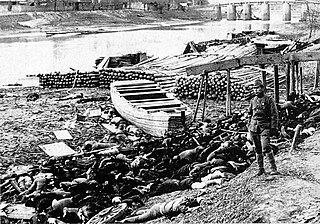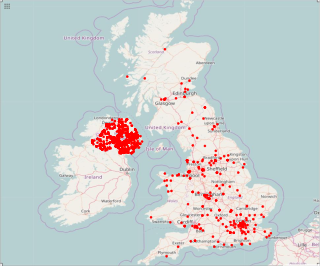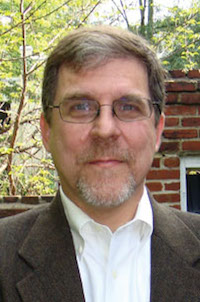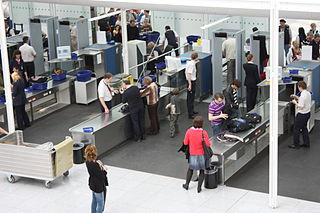Related Research Articles

State terrorism refers to acts of terrorism which a state conducts against another state or against its own citizens.

Terrorism, in its broadest sense, is the use of intentional violence and fear to achieve political or ideological aims. The term is used in this regard primarily to refer to intentional violence during peacetime or in the context of war against non-combatants. The terms "terrorist" and "terrorism" originated during the French Revolution of the late 18th century but became widely used internationally and gained worldwide attention in the 1970s during the Troubles in Northern Ireland, the Basque conflict and the Israeli–Palestinian conflict. The increased use of suicide attacks from the 1980s onwards was typified by the 2001 September 11 attacks in the United States.

Counterterrorism, also known as anti-terrorism, relates to the practices, military tactics, techniques, and strategies that governments, law enforcement, businesses, and intelligence agencies use to combat or eliminate terrorism.
A lone wolf attack, or lone actor attack, is a particular kind of mass murder, committed in a public setting by an individual who plans and commits the act on their own. In the United States, such attacks are usually committed with firearms. In other countries, knives are sometimes used to commit mass stabbings. Although definitions vary, most databases require a minimum of four victims for the event to be considered a mass murder.
Terrorism and mass attacks in Canada includes acts of terrorism, as well as mass shootings, vehicle-ramming attacks, mass stabbings, and other such acts committed in Canada that people may associate with terroristic tactics but have not been classified as terrorism by the Canadian legal system.

Aaron Mannes is an American expert on evaluation of terrorist risk. He has been director of research at the Middle East Media Research Institute and a researcher at the Information and Network Dynamics Laboratory and the Laboratory for Computational Cultural Dynamics at the University of Maryland. In 2004 he published Profiles in Terror: A Guide to Middle East Terrorist Organizations.
Terrorism financing is the provision of funds or providing financial support to individual terrorists or non-state actors.
Matthew Levitt is the Fromer-Wexler Fellow and director of the Jeanette and Eli Reinhard Program on Counterterrorism and Intelligence at the Washington Institute for Near East Policy and an adjunct professor in Georgetown University's Center for Security Studies (CSS). From 2005 to early 2007 he was a deputy assistant secretary for intelligence and analysis at the U.S. Department of the Treasury. In that capacity, he served both as a senior official within the department's terrorism and financial intelligence branch and as deputy chief of the Office of Intelligence and Analysis. From 2001 to 2005, Levitt served the Institute as founding director of its Terrorism Research Program, which was established in the wake of the September 11 attacks. Previously, he provided tactical and strategic analytical support for counter-terrorism operations at the FBI, focusing on fundraising and logistical support networks for Middle Eastern terrorist groups. During his FBI service, Levitt participated as a team member in a number of crisis situations, including the terrorist threat surrounding the turn of the millennium and the September 11 attacks.

Terrorism in the United Kingdom, according to the Home Office, poses a significant threat to the state. There have been various causes of terrorism in the UK. Before the 2000s, most attacks were linked to the Northern Ireland conflict. In the late 20th century there were also attacks by Islamic terrorist groups. Since 1970, there have been at least 3,395 terrorist-related deaths in the UK, the highest in western Europe. The vast majority of the deaths were linked to the Northern Ireland conflict and happened in Northern Ireland. In mainland Great Britain, there were 430 terrorist-related deaths between 1971 and 2001. Of these, 125 deaths were linked to the Northern Ireland conflict, and 305 deaths were linked to other causes, including 270 in the Lockerbie bombing. Since 2001, there have been almost 100 terrorist-related deaths in Great Britain.

James S. Robbins is an American commentary writer for USA Today and Senior Fellow for National Security Affairs on the American Foreign Policy Council. He is the former Senior Editorial Writer for Foreign Affairs at the Washington Times, an author, political commentator and professor, with a focus on national security and foreign and military affairs. He also served as special assistant in the Office of the Secretary of Defense.
Sherifa D. Zuhur is an academic and national security scholar of the Middle East and Islamic world. She was most recently a visiting scholar at the Center for Middle East Studies, University of California, Berkeley and is the director of the Institute of Middle Eastern, Islamic and Strategic Studies.

United Nations Security Council resolution 1624, adopted unanimously at the 2005 World Summit on 14 September 2005, after reaffirming previous resolutions on terrorism, including resolutions 1267 (1999), 1373 (2001), 1535 (2004), 1540 (2004), 1566 (2004) and 1617 (2005), the Council called on all states to co-operate in order to strengthen the security of their international borders by enhancing terrorist screening and passenger security procedures.
Richard Martin Donne Barrett CMG OBE is a former British diplomat and intelligence officer now involved in countering violent extremism. Barrett is a recognised global expert on terrorism who frequently appears as a panellist in related conferences and whose commentary is regularly featured in the press.
Christopher C. Harmon is an American author, editor and independent scholar. He is a Distinguished Fellow at the Brute Krulak Center, Marine Corps University, and Professor at the Institute for World Politics. Dr. Harmon directed the counterterrorism course at the Asia-Pacific Center for Security Studies. From 2007-2010 he was director of studies for the program on Terrorism and Security Studies at the George C. Marshall European Center for Security Studies. His expertise is in the fields of terrorism and counterterrorism, insurgency and revolutionary warfare, counter-insurgency, and international relations. Starting in 2003, Harmon lectured extensively on "how terrorist groups end," as at the Woodrow Wilson International Center for Scholars ; his publications in this arena date 2004 - 2014. He inaugurated the Kim T. Adamson Chair in Insurgency and Terrorism at the Marine Corps University, was for four years Horner Chair of Military Theory, and served for twelve years at Quantico as a full professor teaching subjects such as international relations, the theory and nature of war and strategy and policy. For many years he has taught at The Institute of World Politics, a graduate school of national security and international affairs, in Washington, D.C.

There is a long history of terrorism in Europe. This has often been linked to nationalist and separatist movements, while other acts have been related to politics, religious extremism, or organized crime. Terrorism in the European sections of the intercontinental countries of Turkey and Russia are not included in this list.
Terrorism in Sri Lanka has been a highly destructive phenomenon during the periods of the Sri Lankan Civil War (1983–2009) and the first and second JVP insurrections. A common definition of terrorism is the systematic use or threatened use of violence to intimidate a population or government for political, religious, or ideological goals. Sri Lanka is a country that has experienced some of the worst known acts of modern terrorism, such as suicide bombings, massacres of civilians and assassination of political and social leaders, that posed a significant threat to the society, economy and development of the country. The Prevention of Terrorism Act of 1978 is the legislation, that provides the powers to law enforcement officers to deal with issues related to terrorism in Sri Lanka. It was first enacted as a temporary law in 1979 under the presidency of J. R. Jayewardene, and later made permanent in 1982.

The State Security Service of Georgia (SSSG) is a state intelligence agency of Georgia, under the authority of the Government, which covers a broad spectrum of tasks to preserve national security in accordance to state legislature and relevant laws. Its missions are to protect the constitutional order, sovereignty, territorial integrity and military potential of Georgia from illegal acts of special services and individuals of foreign countries; to prevent violent and unconstitutional change of order and state authority. Further it is to ensure economic security and fight terrorism on national and international level, transnational organized crime and international crime as well as carry out measures towards prevention, detection and suppression of corruption.
Perspectives on Terrorism (PT) is a quarterly peer-reviewed, open-access online academic journal, covering political violence, terrorism and counter-terrorism, It is published jointly by the International Centre for Counter-Terrorism, in collaboration with Leiden University and the Handa Centre for the Study of Terrorism and Political Violence at the University of St Andrews.

An End to al-Qaeda: Destroying Bin Laden's Jihad and Restoring America's Honor is a non-fiction book about counterterrorism strategies towards al-Qaeda, written by U.S. Navy retired cryptology analyst Malcolm Nance. The book describes how the September 11 attacks changed the traditional Muslim community around the globe. Nance criticizes the approach of the George W. Bush administration, including the verbiage and public presentations used in the War on Terror. The author argues al-Qaeda is not part of Islam but is instead a dangerous religious cult. Nance writes the United States should commit to better education with a public relations campaign to encourage traditional believers in Islam around the world to denounce al-Qaeda.

Terrorist Recognition Handbook: A Practitioner's Manual for Predicting and Identifying Terrorist Activities is a non-fiction book about counterterrorism strategies, written by U.S. Navy retired cryptology analyst Malcolm Nance. The book is intended to help law enforcement and intelligence officials with the professional practice of behavior analysis and criminal psychology of anticipating potential terrorists before they commit criminal acts. Nance draws from the field of traditional criminal analysis to posit that detecting domestic criminals is similar to determining which individuals are likely to commit acts of terrorism. The book provides resources for the law enforcement official including descriptions of devices used for possible bombs, a database of terrorist networks, and a list of references used. Nance gives the reader background on Al-Qaeda tactics, clandestine cell systems and sleeper agents, and terrorist communication methods.
References
- 1 2 "About". ICCT. 21 April 2020. Retrieved 15 April 2021.
- ↑ "James J.F. Forest, Ph.D." (PDF).
- ↑ "About the Center for Terrorism & Security Studies". UMass Lowell. Retrieved 16 April 2021.
- ↑ Tufts
- ↑ "About". James J.F. Forest.
- ↑ "Al Libi capture, CNN (October 8, 2013)". CNN. 7 October 2013.
- ↑ "Why didn't Feds follow up more on Tsarnaev? CBS (April 29, 2013)". CBS. 29 April 2013.
- ↑ "Ignoring Domestic, Homegrown Terrorism is Choice that Benefits Few, The Globe Post (Nov. 11, 2018)". GlobePost. 10 November 2018.
- ↑ "Did the Boston Bombers Have Help? CNBC (April 22, 2013)". CNBC. 22 April 2013.
- ↑ "Boston Marathon attack: Circle of possible bombers narrows, experts say. Christian Science Monitor (April 16, 2013)". Christian Science Monitor. CSM. 16 April 2013.
- ↑ "Digital Influence Warfare in the Age of Social Media".
- ↑ "The Terrorism Lectures by James J. F. Forest - Nortia Press". Archived from the original on 2019-07-06. Retrieved 2019-07-06.
- 1 2 3 4 "Praeger - Home". Archived from the original on 2019-07-02. Retrieved 2019-07-06.
- ↑ "Intersections of Crime and Terror".
- ↑ "USSOCOM Library: Joint Special Operations University Press Publications: 2012".
- ↑ "Discipline".
- ↑ "Handbook of Defence Politics: International and Comparative Perspectives".
- ↑ "Rowman & Littlefield | Rowman & Littlefield".
- ↑ "The Conversation, October 11, 2023".
- ↑ "Routledge Handbook of U.S. Counterterrorism and Irregular Warfare Operations".
- ↑ "JAMS Vol 12. No1".
- ↑ "Handbook of Terrorism Prevention and Preparedness".
- ↑ Shortland, Neil; Forest, James J. F. (2020). "Tracking Terrorism: The Role of Technology in Risk Assessment and Monitoring of Terrorist Offenders". Science Informed Policing. Advanced Sciences and Technologies for Security Applications. pp. 57–76. doi:10.1007/978-3-030-41287-6_4. ISBN 978-3-030-41286-9. S2CID 226754019.
- ↑ Forest, James J. F. (2019). "Crime-Terror Interactions in Sub-Saharan Africa". Studies in Conflict & Terrorism. 45 (5–6): 1–21. doi:10.1080/1057610X.2019.1678881. S2CID 208833070.
- ↑ Asal, Victor; Forest, James J.F.; Nussbaum, Brian (2015). "Why do ethnopolitical organisations turn to crime?". Global Crime. 16 (4): 306–327. doi:10.1080/17440572.2015.1081818. S2CID 143268100.
- ↑ Idler, Annette; Forest, James J. F. (2015). "Behavioral Patterns among (Violent) Non-State Actors: A Study of Complementary Governance". Stability: International Journal of Security & Development. 4. doi: 10.5334/sta.er .
- ↑ "U.S. Military Deployments to Africa: Lessons from the Hunt for Joseph Kony and the Lord's Resistance Army". Defense Technical Information Center.
- ↑ "Countering the al-Shabaab Insurgency in Somalia: Lessons for U.S. Special Operations Forces". JSOU Press.
- ↑ Forest, James (January 2012). "Framework for Analyzing the Future Threat of WMD Terrorism". Journal of Strategic Security. 5 (4): 51–68. doi: 10.5038/1944-0472.5.4.4 . S2CID 37645122.
- ↑ "Perception Challenges Faced by Al-Qaeda on the Battlefield of Influence Warfare | Forest | Perspectives on Terrorism". Archived from the original on 2019-07-06. Retrieved 2019-07-06.
- ↑ "Special Issue: A Decade of War on Terror" (PDF). Archived from the original (PDF) on 2016-08-04. Retrieved 2019-07-06.
- ↑ "Harmony and Disharmony: Exploiting Al-Qa'ida's Organizational Vulnerabilities". 14 February 2006.